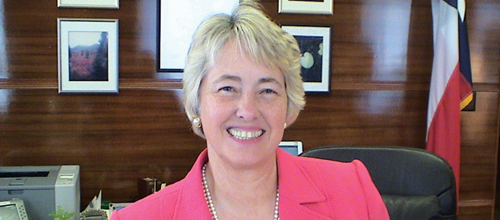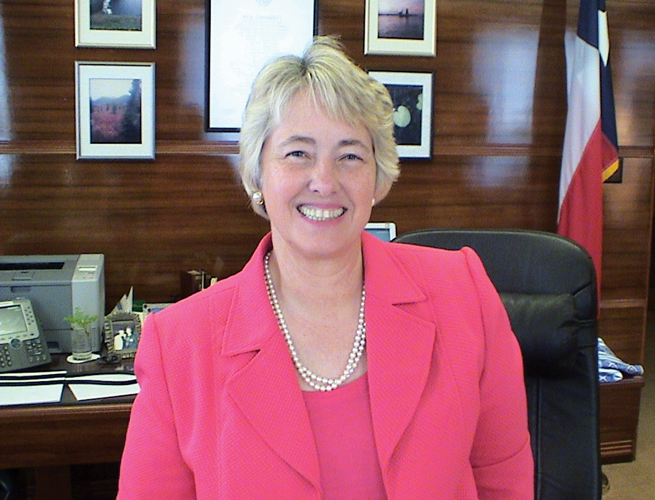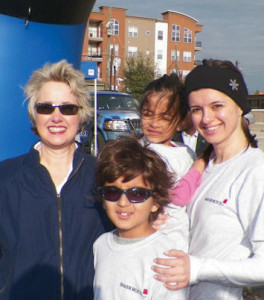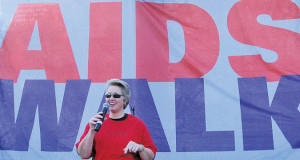
Making History while Running a City

It’s been a busy four years for Mayor Annise Parker.
by Brandon Wolf
Photo by Brandon Wolf
(See also: A Portrait of Houston’s First Lady: Annise’s partner, Kathy Hubbard)
The Houston mayor’s office in City Hall is impressive—not so much for its grandeur, but from a sense of the power and responsibility that has resided within its walls for almost seventy-five years. And for the last four years, a member of Houston’s LGBT community has been the person occupying that office.
When Annise Parker made history on December 12, 2009, by becoming the first openly gay mayor of a major U.S. city, it seemed like an impossible dream had finally come true. A woman from our community was now the most powerful person in the city.
Parker won reelection on November 8, 2011, and is now aiming to be reelected to a third and final term on November 5, 2013. Although she has a city to run and a campaign to wage, she graciously accepted an invitation from OutSmart magazine to look back on her nearly four years in office and reflect on those two busy terms.
The Seat of Power
Mayor Parker’s office suite is located on the second floor of the original Art Deco City Hall building, completed in 1939. This is the focal point from which the sprawling metropolis called Houston is run. From here the orders go out, and back here is where the buck stops.
Visitors wait in a lobby area until shortly before their appointment with the mayor. They are then ushered into an anteroom next to the mayor’s office. This room also serves as the mayor’s press conference room. Convenience and efficiency are essential in this office. The mayor is the most powerful and sought-after person in the city, and her staff must combine hospitality with discipline in order to make it all flow.

The mayor’s huge inner office boasts a large conference table at one end and a comfortably intimate conversation nook at the other. The mayor’s working desk is on one side of the room, facing work tables on the other. On the tables are stacks of papers and briefing booklets. The office is imposing, yet friendly—busy, but not cluttered; orderly and without fussiness.
Easily visible on Parker’s desk is a snow globe of Houston, and also her fountain pen collection. “This pen belonged to my grandmother, who was a schoolteacher,” she says. “I recently had it restored.”
What Does Houston’s Mayor Do?
Asked to describe what she does as the mayor of Houston, Parker pauses. There is no slick sound bite, no rehearsed narrative. She ponders the question, and then says slowly and distinctly: “The mayor runs the city . . . leads the city . . . markets the city . . . and loves the city.”
She smiles, pleased with her response. Then she sets out to explain her answer in more detail.
“I run Houston because this is a strong-mayor city,” Parker explains. “I’m the CEO, and the Council is the board of directors. I have a tremendous amount of administrative authority. In fact, I have all the administrative authority. Additionally, I preside at the Council meetings, set the agenda, and have a vote. Houston is one of the strongest-mayor cities in the nation.
“I lead Houston by being the public face of the city,” she continues. “When there is a crisis, I am the person people see and hear. When things go wrong, I am the person who has to make sure they get handled. If a hurricane is coming in—and thankfully, one hasn’t yet—it’s me and the county judge who are standing out
there, calling the shots and telling people what to do.
“I market Houston by spending a great deal of time promoting good business here—I’m the head cheerleader for the city,” Parker says. Earlier this year, she and her partner, Kathy Hubbard, flew to Istanbul to publicize Turkish Airlines’ new non-stop service between the two cities.

“I love Houston, because one couldn’t put in the amount of hours it takes if they didn’t,” Parker finishes. Her schedule is constant, seven days a week, and she is “on call” at any hour of the day or night.
Parker’s Major Accomplishments
Parker has lots of pride in her administration’s accomplishments. When asked to identify four major ones, she focused on these:
• The economic recession—“I came into office at the lowest point of the recession, and was able to help right the ship, sail it through the storm, and get it to where we are today. I had to make difficult decisions to re-focus and turn the economy around—without raising taxes or making short-term decisions that would have impacted the long-term health of the city.”
• Houston’s infrastructure—“I was able to have productive discussions with Houstonians about the critical issues of our city’s infrastructure. We undertook a massive project of overhauling the water/sewer system and adjusting the rates. We went to the voters with the Rebuild Houston program to create a new dedicated revenue source for this system, which must fund itself. Then we asked voters to approve bond money once again to continue this investment. When a house has problems, you have to fix them. But Houston had not been doing this.”
• Redistricting—“In 2011, we added two new Council seats. We literally had to move every [district boundary] line in the city. It was the most complicated redistricting ever done in the city. We brought people together, we had a transparent process, and we showed how it could be fair to everyone. Although Harris County and the State of Texas are still litigating their redistricting, the City was never sued.”
• Homelessness—“I picked up something no one wanted to deal with for a very long time. Last year we chose to move the needle on homelessness. There is much left to do, but we have dropped the homelessness rate by 25 percent. In one year, we brought together resources that hadn’t worked together before, and we housed five hundred chronically homeless veterans. I can’t prevent homelessness, because there will always be situations where people end up in circumstances beyond their control. But I can solve the problem of people who have been on the streets for years. We are on track to end homelessness in the next two years.”
But along with the accomplishments in political life come the disappointments. Parker says the worst political loss for her was the traffic red-light cameras controversy. “It was a no-win situation right from the beginning. Doing away with the cameras was the wrong thing to do. But I respect the democratic process, and the voters voted. The cameras are now gone, but the city lost a lot of money—from revenue and from the broken vendor contract.” The issue cost Parker a lot politically, too, and dogged her for months after the issue was settled.
The Mayor’s Proudest Moments
Parker says that the victory celebration following her first election was undoubtedly her most exciting night of the last four years. “That’s when everything seems possible,” she says. “The harsh reality of all the things that have to be done hasn’t hit you in the face yet.”
But in everyday terms, she says her most triumphant moment was when the Council gave a supermajority vote to her proposed overhaul of the water/sewer system in early 2011. “That’s not a super-sexy thing,” she says, “but it was very significant.
“We knew there was a problem. We identified the scope, we outlined the issue for the Council and the public, and we presented different options for correcting it. We worked with the Council to find the option that was the most appropriate. We came to agreement, and we got it done. It was the right thing for the right reason with the right outcome. It was the best-executed thing we’ve done.”
The benefits of that new infrastructure plan were soon felt throughout the city. “It helped us get through the drought of 2011.” During that time, an average of seven hundred water-main breaks were occurring daily. The new revenue stream enabled the replacement of aging pipes in Houston’s 7,000-mile-long system. The majority of failing pipes were giving way as they expanded in the heat. The soil that usually provided pressure on them was now dry and unable to provide stability. With the new financial plan in effect, the City was able to deal with the unexpected crisis without losing traction on the long-term goals.
Mayor Parker’s moments of greatest pride come from seeing the performance of the City’s more than twenty thousand employees. “I love it when a whole team executes a plan, or when a department does something amazing,” she says.
“There have been cave-ins from massive water main breaks in freezing weather that caused giant sinkholes—and City employees have been out there in the middle of the night making repairs. If an ice storm is expected, Public Works crews are pre-stationed around the city, ready to go to work immediately.
“And we are now on the map for major sporting events,” she continues, “because we execute so well. The NBA All-Star Game and the NCAA Final Four ran like clockwork. Visitors came and enjoyed the event, and it’s been a smooth experience for them. Traffic is heavy, but it moves quickly. Thousands of City employees and other Houstonians make every aspect work.”
Moments of Emotion
“The worst moments are when we lose an employee in the line of duty,” Parker says. “And public memorials really tug at my heart.” On May 31, 2013, the worst tragedy in the history of the Houston Fire Department occurred when four firefighters were lost while containing the blaze at a burning hotel.
Parker and her partner immediately went to the hospital to offer support to the families. During that time, a news conference photo of an obviously stricken, teary-eyed mayor hit the media outlets.
“I don’t do drama and a lot of emotion,” says Parker. “Not that I don’t feel it. But my normal state is to close the door and deal with it privately. But that night I was overwhelmed with emotion, and I felt that it was a time when I had to deal with it publicly. People needed to grieve, and I had to let myself be the face of it.”
The Daily Routine
“We are the level of government that functions every day,” Parker says. “We function 24/7 and we have a direct impact on people’s lives. Whenever we solve a problem or get something fixed, it’s a great feeling.”
But the job is also demanding of her time. “I’m picked up at 8 a.m., unless there is a breakfast meeting scheduled, and then it’s earlier.” Her daily staff meeting begins at 8:30 a.m. and can run from thirty to sixty minutes. “That’s when I find out what blew up overnight—figuratively and literally.” ➝
The rest of the day is scheduled in half-hour increments. “It’s meeting, meeting, meeting, a speech at lunch to a civic association, and then more meetings.” The mayor tries to walk back in the front door of her home at 8 p.m.
Weekends are different, but still demanding. Usually there is an early-morning kickoff of an event that she is asked to attend. During campaign season, there are candidate forums. She is asked to judge events ranging from a school reunion cook-off to the Art Car Parade entries.
Most weekend evenings are filled with various galas and charity fundraising parties. Occasionally, Parker may have a few hours to herself and her family on the weekends. “I ask my staff to try to keep one day a month, usually a Sunday, totally free of any activities,” Parker says. She admits even that is not always successful.
“The sheriff is here,” an aide announces as we wrap up our conversation. It sounds like a cue to end the interview, but the mayor’s assistant says calmly, “That just means he’s next in line.”
Parker’s Legacy
Asked what she would like her legacy to be, Parker says it shouldn’t be a building with her name on it. “I’d just like to be remembered as having led the City well—managing it through difficult times, undertaking an amazing amount of projects, and leaving it better than it was.
“It’s a great gift to me to be able to make decisions that shape the future of my home town,” Parker says. “To be able to work with professionals and Council members to do things which are truly transformative—to work on things like the expansion of the Bayou hike-and-bike trails that will pay off for Houstonians for generations to come.
“During my administrations, there have been no scandals. People have disagreed with some of the things I’ve done, but we’ve been honest and ethical. I’ve told the voters the truth—whether it was pleasant or not—and I’ve accepted accountability for my actions.”
From the beginning of her campaign for the mayor’s seat, Parker has been careful not to be stereotyped as “the lesbian mayor.” She’s responded to the issue when asked, but always moved on to the real issues that face the city.
When she was first elected in 2009, the international media attention was unparalleled. But it gave Parker an amazing opportunity to pivot away from the gay issue and focus on showing the world what Houston has to offer.
“Now we are always showing up on ‘Ten Best’ lists,” Parker says. “And none of this is made up. My election just gave Houston an opportunity to sell itself. It has evolved from a ‘big small city’ to an urbane, cosmopolitan place.”
Although Parker has avoided the one-dimensionality of being “the lesbian mayor,” Houston’s LGBT community will always think of her as “one of our own.” The deafening applause that greets her each year as she and Hubbard ride in the Pride Parade demonstrates the depth of that pride.
For the older generations in our community, she represents the sea-change that has occurred in Houston during the last few decades. The Police Department that once raided gay bars with impunity now reports to a lesbian. That same department whose harassment of LGBT citizens led to ruined careers and reputations a few generations ago is now tasked with protecting the life of a lesbian mayor at all costs, even if it means sacrificing their own lives.
For the younger generations in our community and beyond, Mayor Parker is a role model, a celebrity, and a hero. Sometimes when she is out and about, not in an official role, a young child might approach her and ask if she is the mayor. Assured that she is, the young fan asks her to pose for a picture of the two of them together, and then seeks a hug. “That is the coolest part of being Houston’s mayor,” Parker says.
Brandon Wolf also writes about Kathy Hubbard in this issue of OutSmart.
See also: A Portrait of Houston’s First Lady: Annise’s partner, Kathy Hubbard











Comments